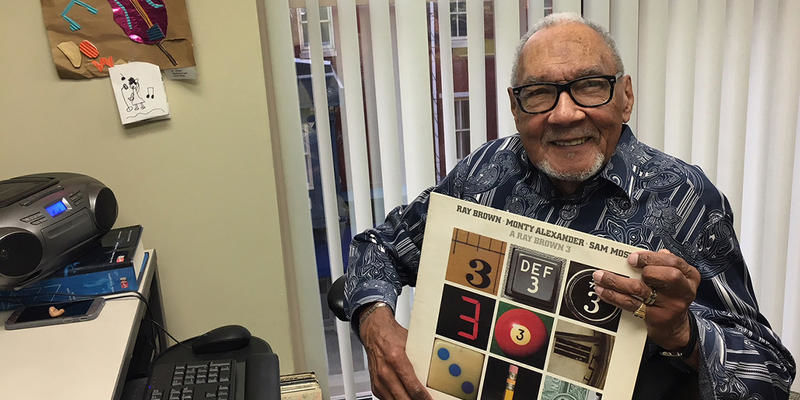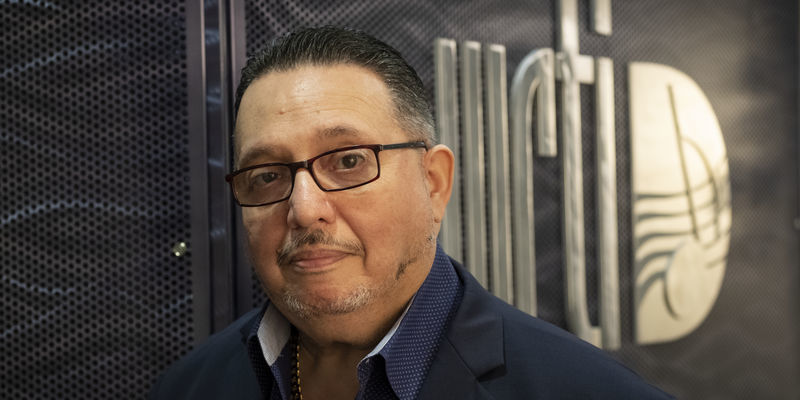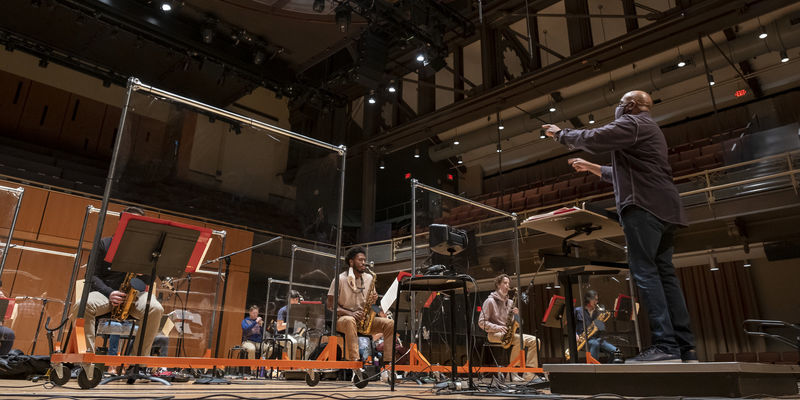Meet the female hosts of WRTI
In honor of Women’s History Month, the five women who host programs on the station talk about broadcasting and what it’s like to be a female host.
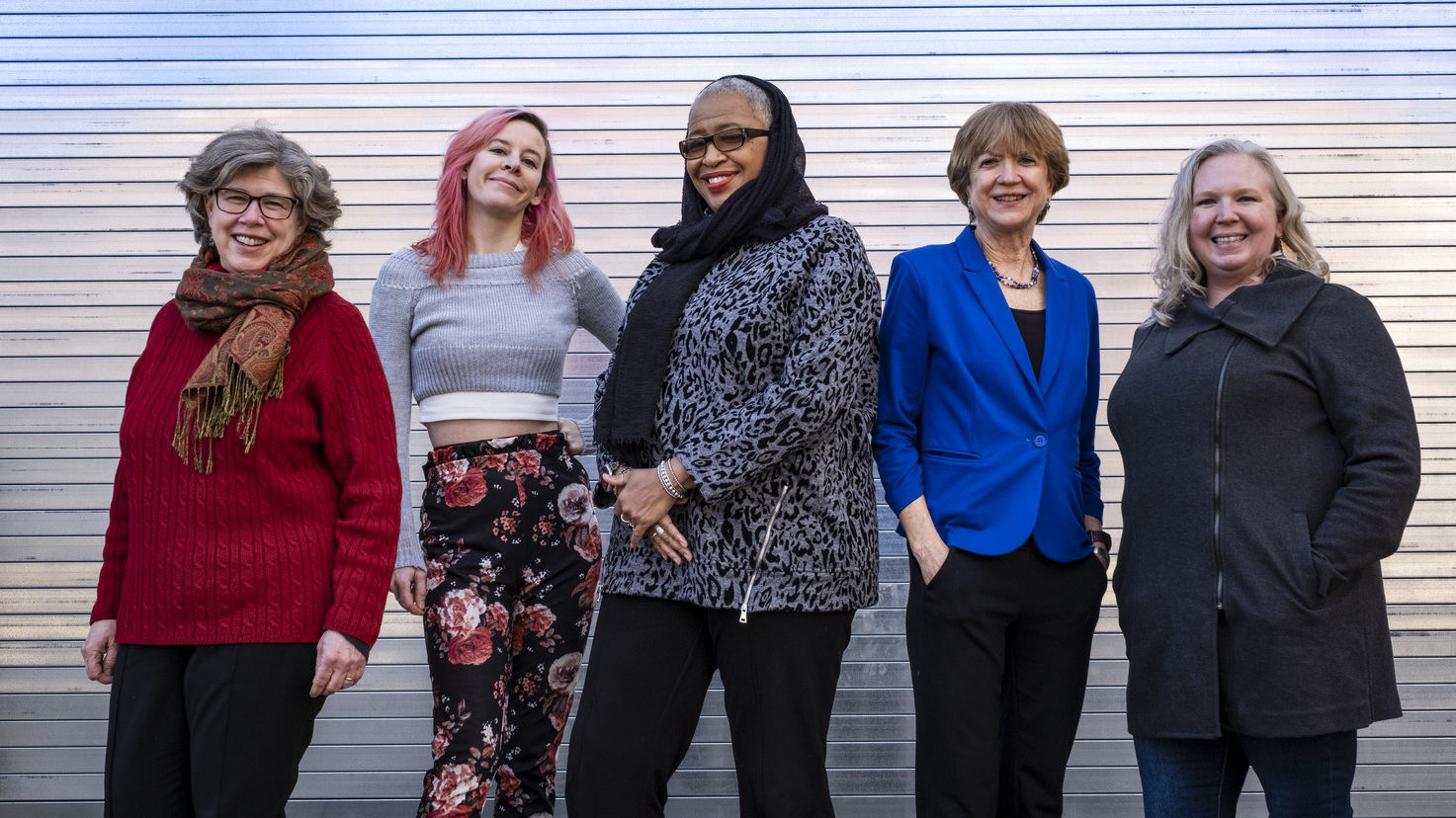
In celebration of Women’s History Month, we’re shining a spotlight on the female hosts of WRTI.
Courtney Blue, KLN ’12, hosts Late Evening Jazz, The Jazz Request Show and Nouveau Jazz Showcase. She’s been at WRTI for over 10 years and started as a Temple student in 2011.
Bobbi I. Booker, KLN ’85, hosts Jazz Through the Night and the “Spirit Soul Music” edition of Ovations, and has been at the station since 1981.
Susan Lewis is senior producer of arts and culture, producer and lead interviewer for The Philadelphia Orchestra in Concert, and host of WRTI’s online interview series, TIME IN. She’s been at WRTI since 2005.
Maureen Malloy, KLN ’03, is jazz music director of WRTI and sometimes heard filling in, and on, In a Mellow Tone. She’s been part of the station since she was a student at Temple and started filling in for some overnight slots in 1999.
And Melinda Whiting, who hosts Classical Weekdays and The Philadelphia Orchestra in Concert, has been associated with the station since 2017.
We spoke with them about what they love about radio, what it’s like to be a female host and what makes WRTI special.
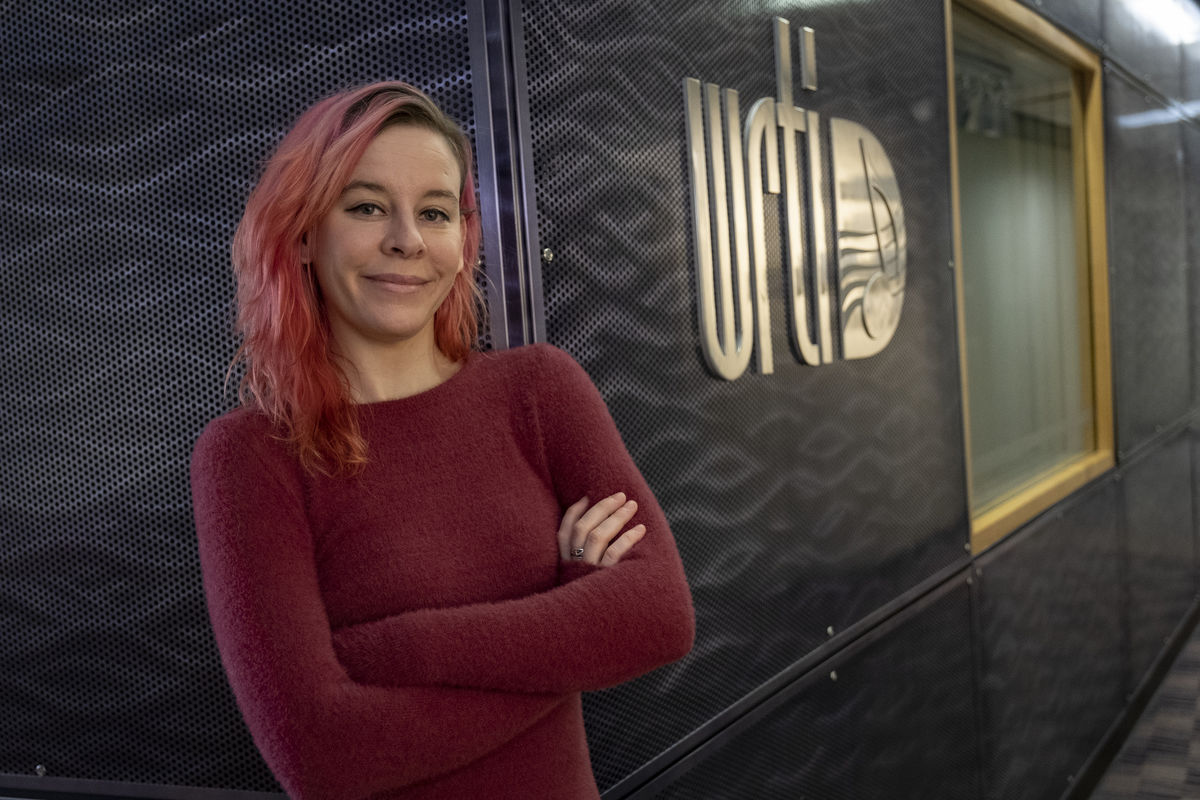
Courtney Blue started at WRTI as a student over a decade ago. (Photo by Joseph V. Labolito)
Temple Now: What first drew you to broadcasting?
Courtney Blue: I went to community college and I was the station manager at the radio station there. Also, I’ve always been interested in radio, since I was a kid. I would tape radio shows on cassette and make mixtapes. But I didn’t think about radio seriously until I wanted to go back to college (I was previously a graphic designer). I was looking through Temple’s majors and, when I saw broadcasting, I knew that was what I was supposed to be doing. There’s a Talking Heads song with lyrics that say, “If your work isn’t what you love, then something isn’t right.” And that’s something that’s held true for me.
Bobbi I. Booker: I’m a reluctant broadcaster. It was not my dream nor my intention to be engaged as one. I actually studied to become a print journalist because writing was and still is my forte. I entered Temple University immediately after finishing the Parkway Program. After being on campus for about a year, one of my classmates from a news writing course impressed upon me to fill in because someone didn’t show up for a shift at WRTI. It was the summer of my sophomore year and I was working as a student security guard. I had about 90 minutes’ notice and at noon, I was on the air reading my first newscast.
Susan Lewis: I got involved in broadcasting late. I took all the pre-med requirements at college, not knowing what I wanted to do, and majored in philosophy, then went to law school because I thought that was a logical extension of philosophy. I ended up working for a Wall Street law firm, but realized I didn’t want to specialize in corporate law. I was always interested in learning new things, so I became a freelance writer and wrote columns for Philadelphia Magazine and essays for parenting publications. I also taught entertainment law at Rutgers. Then I became a speechwriter for women in government.
Around 2005, I got an opportunity to contribute to an arts show at WRTI. And that involved doing so many things that I like to do: learning about new things in the arts, writing, talking to people about their stories. I think broadcasting is one of those fields that enables you to dive into all these different subjects and cultures and people. It’s fun and it’s interesting and it’s endless in terms of its possibilities.
Maureen Malloy: I enjoyed writing early on. I had a teacher who said she liked the way that I wrote and that she thought journalism might be a good concentration for me. I was very interested in radio too. TV was king but morning shows were still huge and radio stations were the ones putting on concerts. I thought it would be cool to be a radio DJ and be at radio events.
Melinda Whiting: Radio’s both been my first career and also something that I really found it difficult to not be doing, even when I was doing other things. What first drew me to broadcasting was I was listening to the radio all the time when I was young. Sometimes it was rock and roll, sometimes it was classical. Every kind of radio interests me. I just find it to be an incredible, intimate medium and the relationship that you can have with listeners is unlike any other kind of media. I lean towards listening.
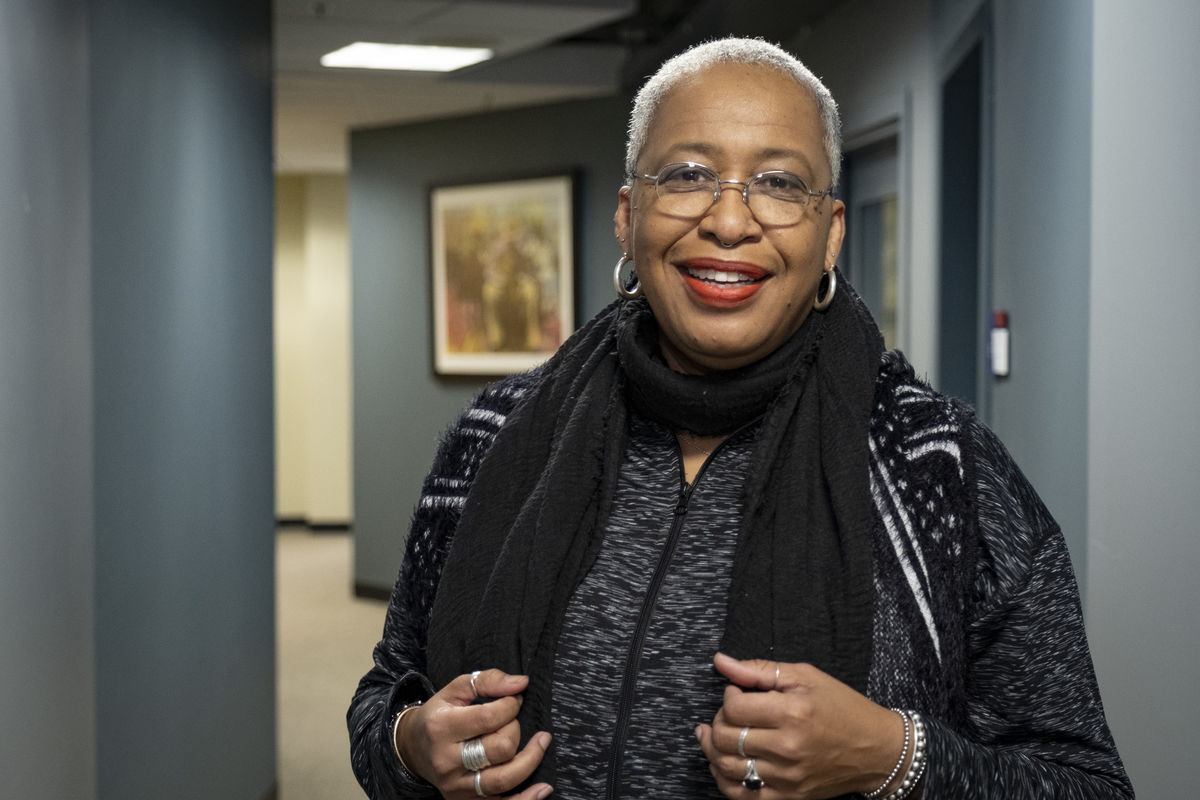
Bobbi I. Booker tries to deliver a musical message that moves listeners. (Photo by Joseph V. Labolito)
TN: What’s it like being a female host? At many radio stations, not just WRTI, there seem to be slightly more male hosts than female ones.
BB: That is a matter that I have dealt with personally and professionally with the visible lack of women in broadcasting and in media. However, there are always women present, but often invisible in a lot of media forums.
My media mentor Reggie Bryant (former interim station manager and host of WRTI’s Catharsis) met me during my second year or so being affiliated with the station. He said something to me that continues to resonate. “Never walk away from a medium that you can control and one that you’re good at.” That shored up my confidence and gave me the foundation to put up with the challenges. Now, a lot of changes have started to take place—and I wasn’t alone in wanting change, as there were a lot of men who felt the same in not wanting to see women disenfranchised.
There is still a sense of male entitlement that I especially encourage young women coming into the business to challenge. [I tell them]: stand up for yourself, don’t accept nonsense and utilize each and every encounter as both a learning and teaching experience.
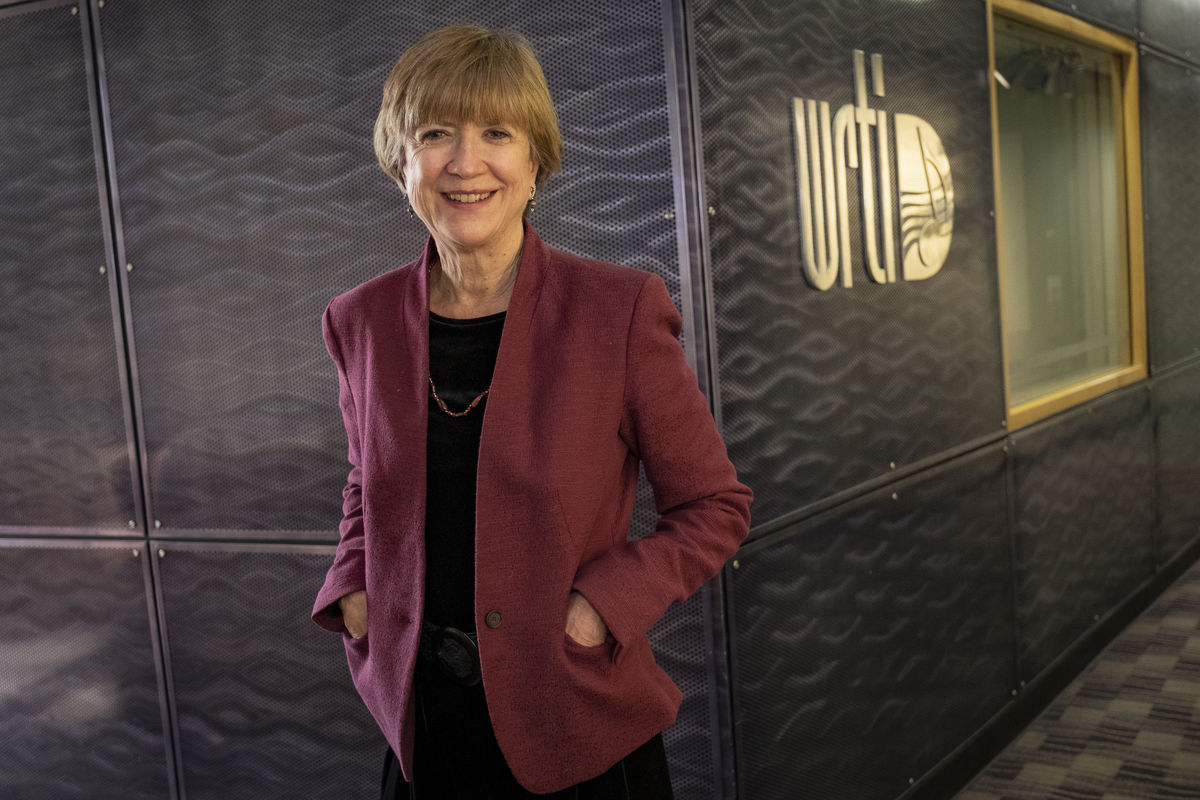
Susan Lewis was a lawyer, columnist and speechwriter before becoming a broadcaster. (Photo by Joseph V. Labolito)
SL: I think whenever you enter a field, whether it’s law or broadcasting, there’s an initial tendency to want to show that you can do it the way it’s been historically done, that you can fit in. But the real challenge and the real value is in being who you are. And to see if you can find your own voice and have the courage to use that voice and therefore contribute something that’s maybe totally different to what the field is used to.
MW: I’ve never been anything but a female host so I don’t really have anything to compare it to. There were always plenty of opportunities for women in public radio, even when I was young, so I don’t think I've ever worked anywhere where there were more men on the air than women. I think WRTI is sort of half and half right now. On the classical side of the full time staff there’s only three of us on the air full time, two men and me. And we have some relief hosts who are coming on board who are women.
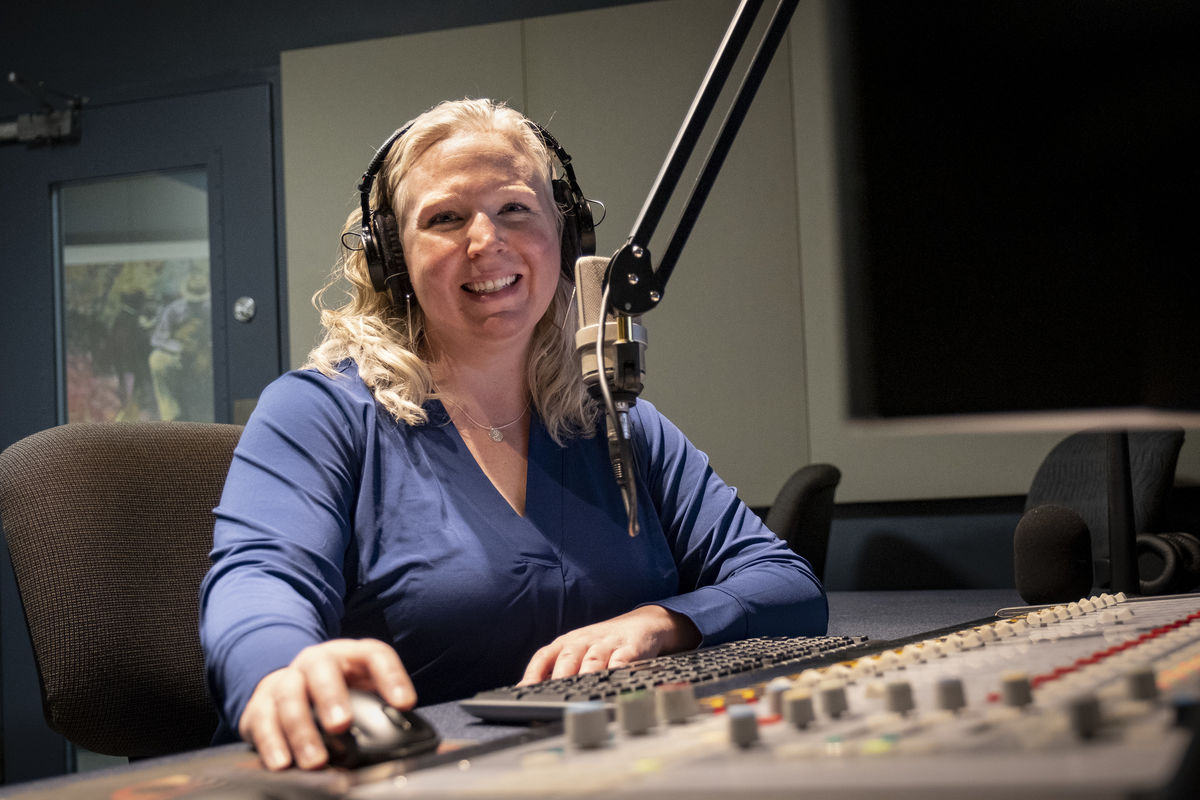
Maureen Malloy loves the connection she has with WRTI's listeners. (Photo by Joseph V. Labolito)
TN: What do you love most about radio?
CB: Particularly with WRTI and community radio it’s the people. It’s the connection to the community. They’re not only our biggest supporters financially but they inspire me to keep going. Because we speak directly with them, I’ve become friends with many of them. And I think about them when I’m putting a program together or when I’m on the air. One of my favorite things about being in radio is also the music itself. I’ve tried to focus on making playlists with 50% female artists and to turn people on to music they might not have heard.
BB: Initially, my big love of radio was on the other side as a listener. We’re talking analog days when you had to deal with static and adjust antennas. Now, I am a radio host, and co-producer on Jazz with Bob Perkins, a beloved show for listeners. I watch as Mr. Perkins puts in the research and prep time for his program, and that underscores how I deal with my programs. While I host Jazz Through the Night daily, the program closest to my heart is “Spirit Soul Music” on Ovations. I curate the playlist and I’m always thinking about the messages in the music that made it possible for me to navigate my early life. The messages are not just of positive and respectful communication, but also of social consciousness. It’s always my intention to deliver a musical message that helps remind people of the higher power that lives within them and beyond them—and that’s something that gives me joy.
SL: I love the idea of radio because it’s both intimate—in some ways you’re talking to a person sitting in his or her kitchen or car—and at the same time it’s very communal, because so many people are listening to the same thing. You could have a great CD collection. But if you turn on the radio you’re going to listen to a host saying, “I love this piece of music,” and explaining why and it’s like sharing something with a friend. It’s very personal.
MM: I was hosting In a Mellow Tone [a few nights ago]. It’s a quiet, calm show to get you ready for the busy week ahead. I happened to look at my social media feed before I went to bed and a great local musician said, “Hey, Maureen Malloy, thanks so much for playing Django Reinhardt. It was great on a cold night to have this kind of music to just get you through.” You forget sometimes that people are listening, even though that’s why we’re here. And when you have an actual human reach out and say what the music meant to them, it means a lot. It’s good to be able to help out, even if it’s something small like making someone happy for a minute because they heard a song.
MW: The intimacy of it. The immediacy of it. The opportunity to share what you love with someone on the other side of the speakers who loves it as well. We get to hear from our listeners constantly and I feel like we have a very close relationship with them, particularly during fundraisers. When they call in their gifts or they tap them in on the computer, they’re always including little comments about what they like. And it’s very encouraging. It makes me feel it’s not just me, we really are a community.
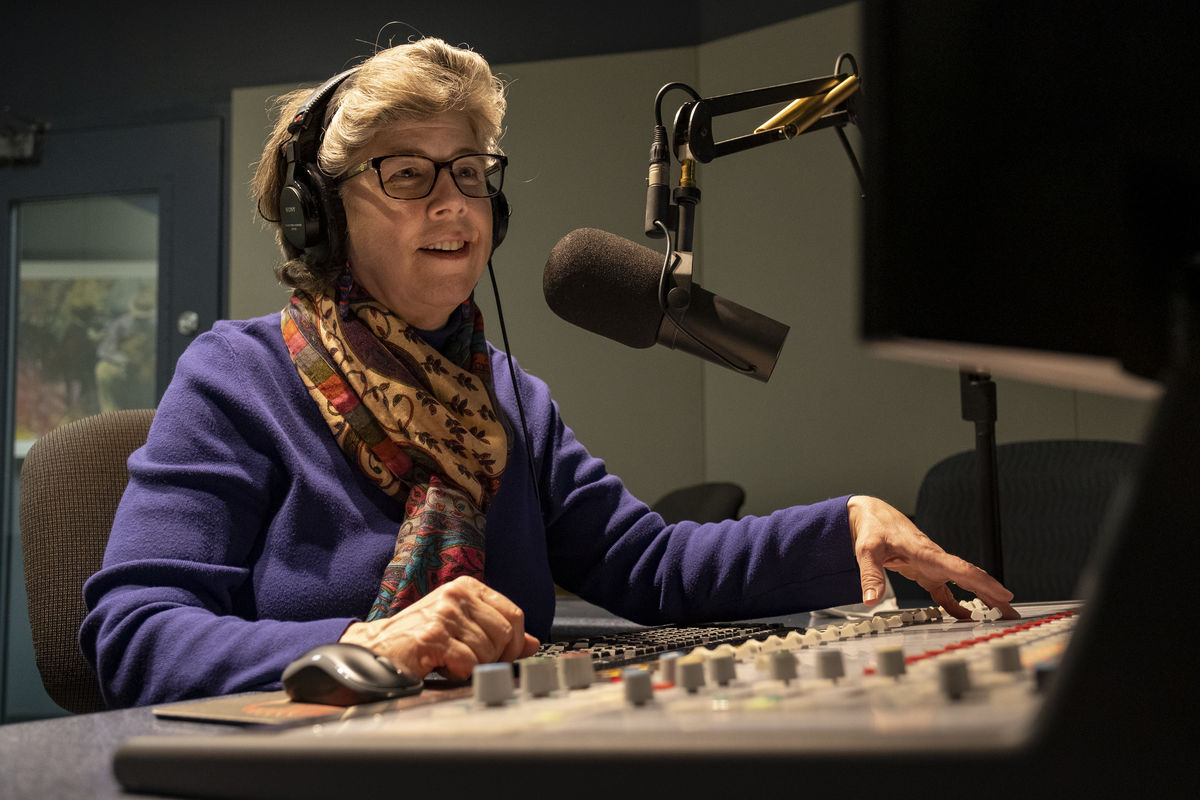
Melinda Whiting began her career in radio and feels it's a medium like no other. (Photo by Joseph V. Labolito)
TN: What makes WRTI special?
CB: We’re a jazz and classical station and that format is diminishing from cities across the country. That’s why we have people who are members listening in Florida. And people all across America who are outside of our FM broadcast range who listen via our app or streaming. We even have people in Germany listening. We’re real people, we’re there for them, they support us and we care about the music.
BB: WRTI continues to exist in spite of the challenges that it has faced over the years. Ever since I have been aligned with WRTI, it has been evolving. And through it all, we’ve always maintained a foothold in the community. Nothing proved how much we mattered to this community more than the pandemic, when people finally had time to listen to us beyond their daily commute. The classical music folk wandered a little onto the jazz side and a lot of the jazz people wandered onto the classical music side as listeners. I’m honored to be a small part of this station’s story.
SL: What we say on the air is really true: WRTI exists for a community of listeners and it exists because of those listeners. We rely on member support and it’s a service that expands your world. Sharing music, sharing people’s stories, connecting people in a community—it’s all done because the community wants it. And because it’s something that anyone with a radio can join in on, it makes it accessible to everyone. That’s a wonderful thing.
MM: The people here. Public radio in general, not just WRTI, has had a rough few years. Things have been different. We earn most of our own money and we had to figure out how to continue to do that. We couldn’t have without the dedication of the people who are here, who pivot so quickly and don’t even bat an eye at doing something extra. We don’t have people here saying, “That’s not in my job description. I don’t get paid for that.” If they’re capable of doing something, they volunteer to do it just to make sure that everything works as it should, or to try something new, or to do something to make the station better.
—Edirin Oputu
